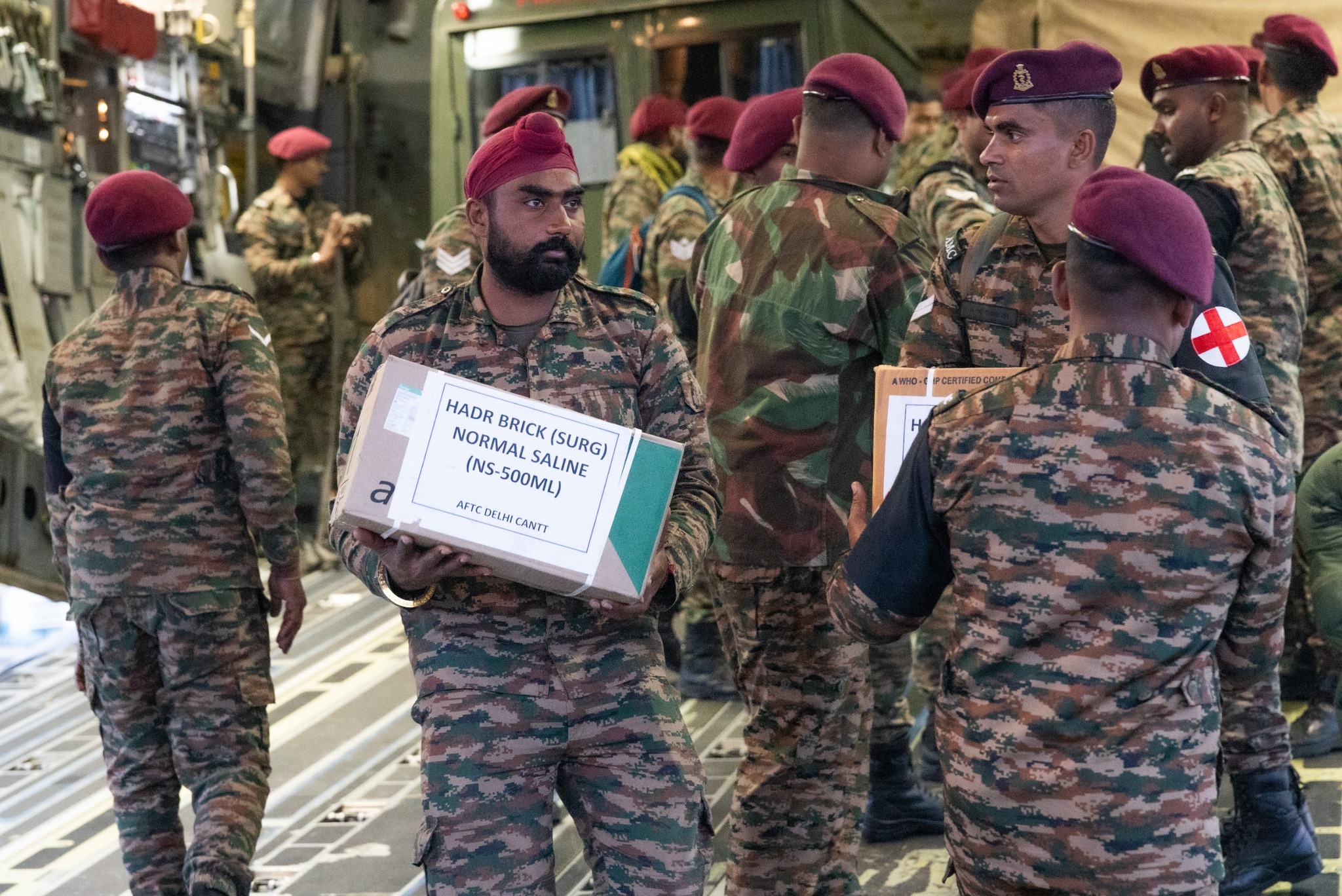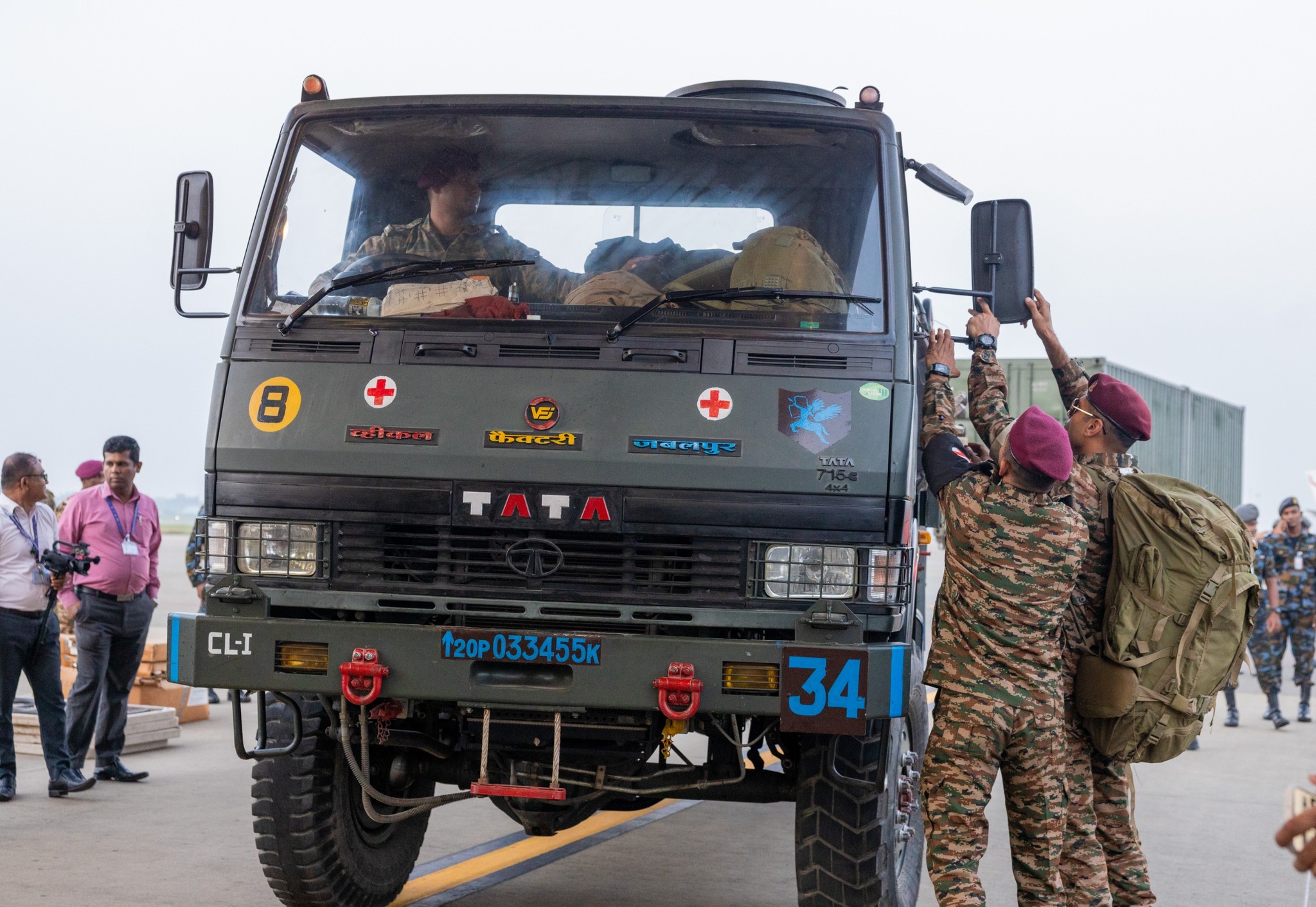News

Disaster relief shipment from Switzerland arrives in Sri Lanka
An aircraft carrying 2.6 metric tons of disaster relief supplies from Switzerland touched down at Bandaranaike International Airport (BIA) in Katunayake this morning (06).
The shipment, consisting of 17 packages that include water purification units and supporting operational equipment, was flown from Zurich on Edelweiss Air flight WK 064.
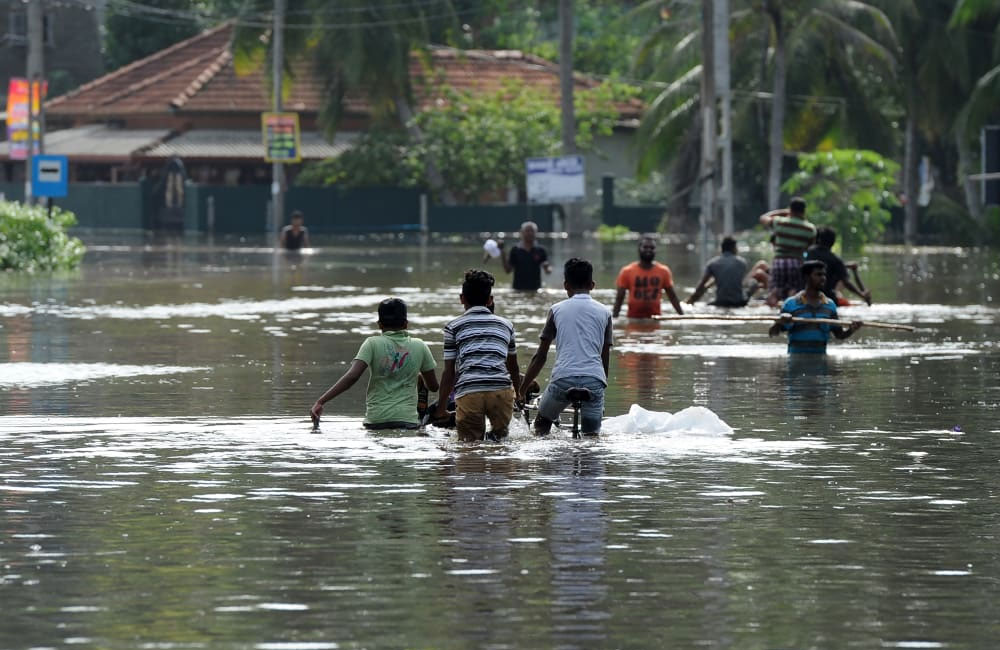
Sri Lanka cyclone tragedy exposes government failures
Officials in Sri Lanka are facing immense pressure for their alleged mishandling of Cyclone Ditwah, with the crisis highlighting deep cracks in the country's emergency response system.
Days after Cyclone Ditwah tore through Sri Lanka, over 1.46 million people across all 25 of the nation's districts remain affected by the island's worst flooding disaster in two decades.
According to the government's Disaster Management Center, the official death toll stands at 410, with 336 people still missing. More than 64,000 people from 407,000 affected families are sheltering in nearly 1,450 government-run safety centers across the country.
Thousands trapped, isolated
Multiple countries have responded to Sri Lanka's appeal for assistance with India leading the charge, followed by pledges from the UK, China, Australia, and Nepal. Sri Lankan President Anura Kumara Dissanayake has also declared a state of emergency to deal with the aftermath of the cyclone.
Despite his declaration and the promise of international aid, however, the Sri Lankan public seems increasingly frustrated with the state's response. Authorities appear to be overwhelmed with rescue demands and are struggling to communicate in a timely manner as critics point out the absence of a unified relief-and-rescue system.
Paikiasothy Saravanamuttu, executive director of the Colombo-based Centre for Policy Alternatives, accuses the Sri Lankan government of failing to heed warning signals and allowing the calamity to spiral beyond human control.
"The government has not come off well in its handling of the crisis and should have called Parliament to convene urgently to review and strengthen disaster management policies," Saravanamuttu told DW.
According to Saravanamuttu, "this disaster reveals significant gaps in preparedness and response mechanisms" and the existing frameworks need to be evaluated to "prevent future failures."
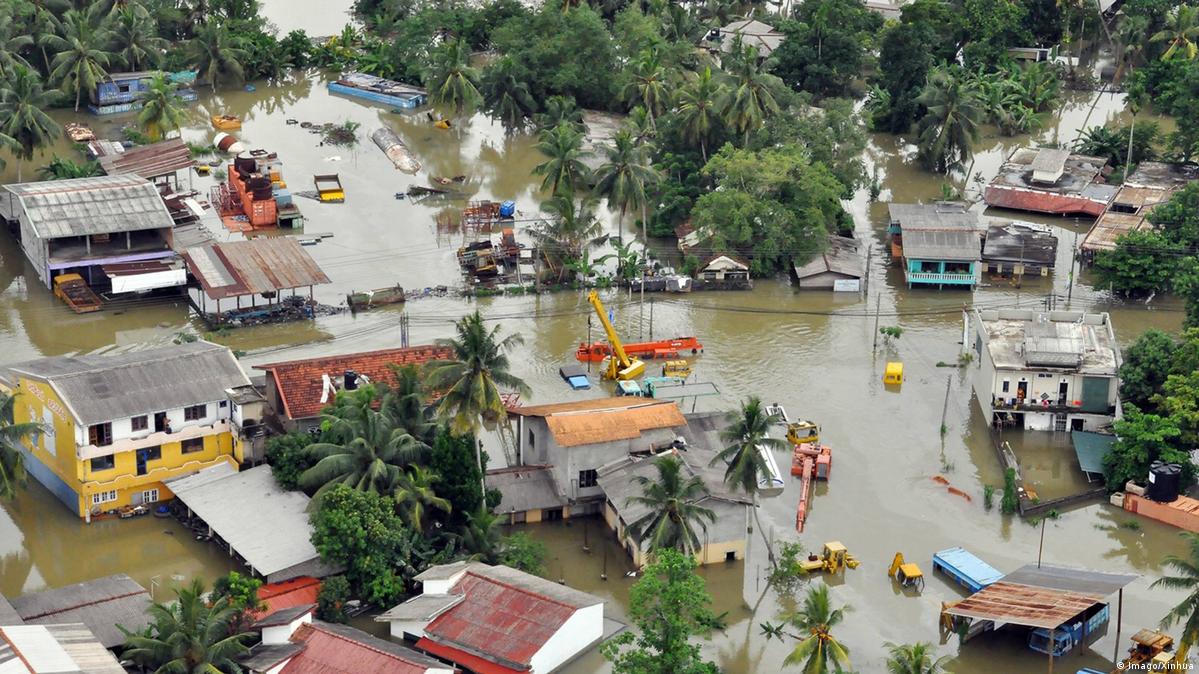
Early warnings wasted
While Ditwah made landfall in Sri Lanka on November 28, some voices point out that warning signals were present as early as two weeks before. Experts say that the loss of life was exacerbated by the government's failure to act in a timely manner.
"Unlike tsunamis, hydrometeorological hazards like cyclones arrive with sufficient notice of several days to take precautions. As early as November 12, Sri Lanka's department of meteorology had publicly flagged the prospect of extreme rainfall later in the month. That should have triggered a process of preparations across the government at central, provincial, and local levels," Nalaka Gunawardene, a science writer from Colombo, told DW.
"Apparently, that did not happen, and an official response has mostly been reactive when Cyclone Ditwah was imminent or after it made landfall," added Gunawardene.
"The entire disaster management structure – from policymakers to state officials – should be held accountable for cascading failures that made a bad disaster much worse."
Kishali Pinto-Jayawardena, a public interest advocate and legal columnist, agrees that the aftermath is "particularly horrendous as the deadly impact of the cyclone was not realized until it was far too late."
She told DW that the governments should have "the ability and the competence to take critical decisions" in times of emergency.
"Sentimental outpouring by politicians lauding the people for 'coming together' in times of crisis does not substitute for that duty," she added.
Rescue teams stretched 'beyond capacity'
Sivanathan Navindra, a former Liberation Tigers of Tamil Eelam (LTTE) member, who has been involved in political activities post-conflict, said the cyclone has damaged roads and communication lines in northern Sri Lanka.
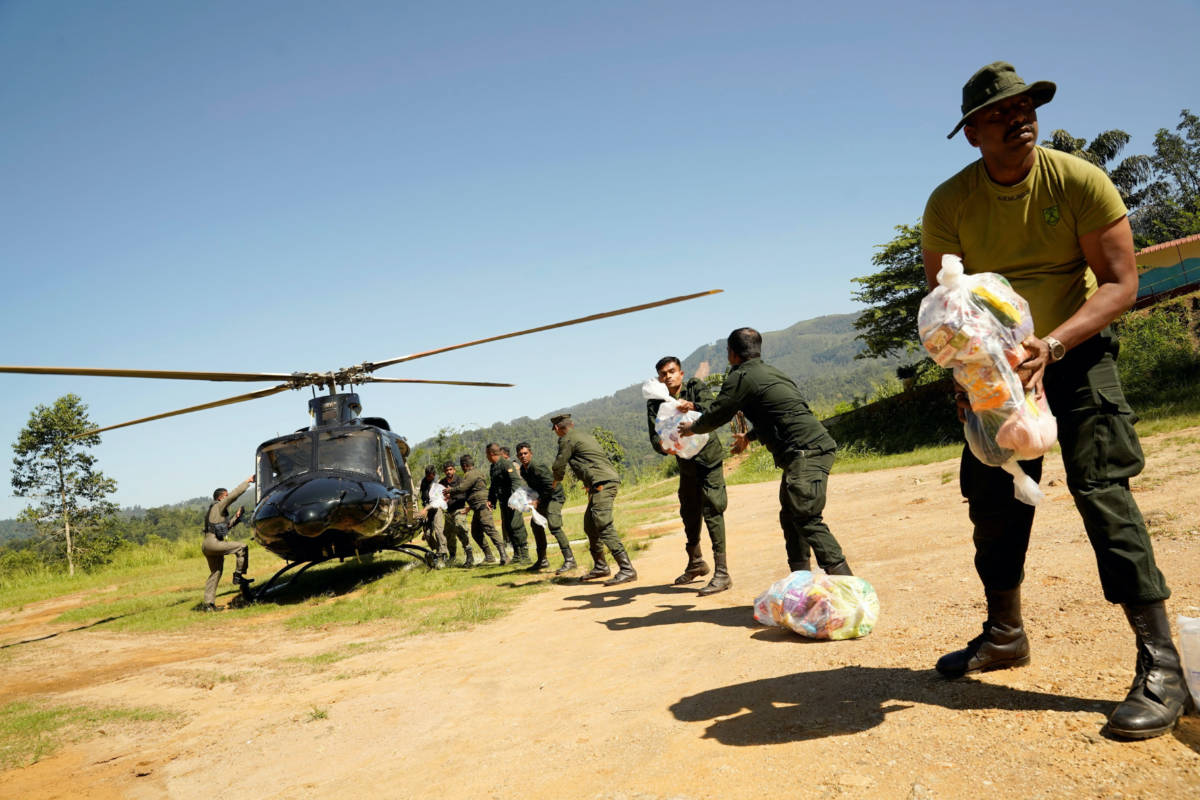
"The situation in northern Mannar, Mullaitivu, Vavuniya, and Kilinochchi districts is extremely severe. Mullaitivu has experienced a total power outage with telecommunication towers down, leaving residents without phone or internet access," Navindra told DW from Jaffna.
"Road closures have effectively cut off the northern province, with travel between Vavuniya, Mullaitivu, Kilinochchi and Jaffna impossible," he said.
Chathuranga Abeysinghe, deputy minister of Industry and Entrepreneurship Development, warned that rising water levels will make evacuation "extremely difficult." He urged residents along the Kelaniya River and flood-prone areas to leave.
"There have been immense hardships caused by Cyclone Ditwah, but the president has constituted task forces to study the impact and organize relief. It will take a while for rebuilding," Abeysinghe told DW.
"We had initial difficulty in predicting the cyclone's course" Abeysinghe said, noting that significant rainfall expected was many different areas which "stretched rescue teams beyond capacity to reach everyone in need."
Abeysinghe also pointed out that the government was working on a war-footing to reach vulnerable populations that had been cut off.
Opposition blames government for loss of life
Government critics, however, remain unconvinced by the official narrative. Opposition party Samagi Jana Balawegaya (SJB) recently pledged to launch legal action against the government.
SJB lawmaker and spokesperson S M Marikkar compared the severity of the disaster to the Easter Sunday suicide attacks which killed nearly 270 people in 2019, and the more recent economic collapse under the powerful Rajapaksa family.
"Similar to the criminal case filed against the Rajapaksas for bankrupting the nation, we will file a case against the current government, as they are responsible for every citizen that died in the disaster," Marikkar told the media on Monday.
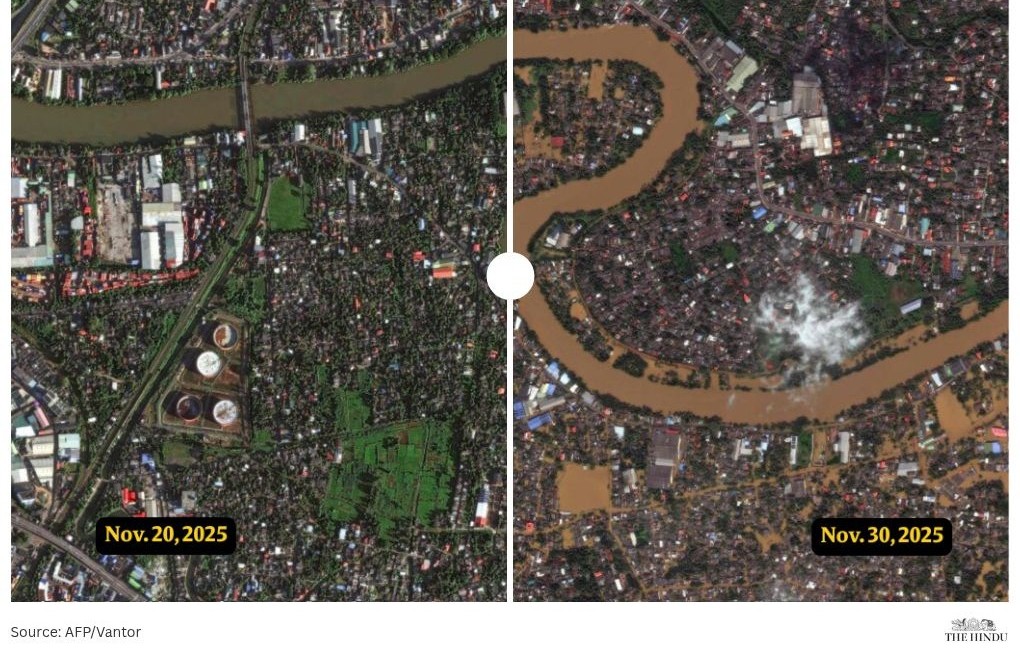 Overview of houses and buildings in the Sri Lankan capital Colombo before and after flooding in the city
Overview of houses and buildings in the Sri Lankan capital Colombo before and after flooding in the city
Too few alerts in Tamil language
Despite some relief materials being delivered and emergency teams arriving to certain affected locations, many communities still lack clarity on when full help will arrive and when normalcy can be restored. A notable communication obstacle, according to Colombo-based disinformation expert and analyst Sanjana Hattotuwa, is the choice of languages officials use for disaster communications.
The nation recognizes both the majority language of Sinhala and the smaller Tamil language as official, with English — a remnant of the British colonial period — also spoken to varying degrees by nearly a quarter of its population.
"My research showed key updates were in Sinhala only, and sometimes mirrored in English, but rarely, if ever in Tamil. State television and radio did not communicate the risks, and threats, mirroring what was evident on social media," Hattotuwa told DW.
"This contributed to [an] information vacuum in critical hours, impacting preparedness and community responses," he said. "If information was available in a more effective and timely manner, lives now lost may have been saved."
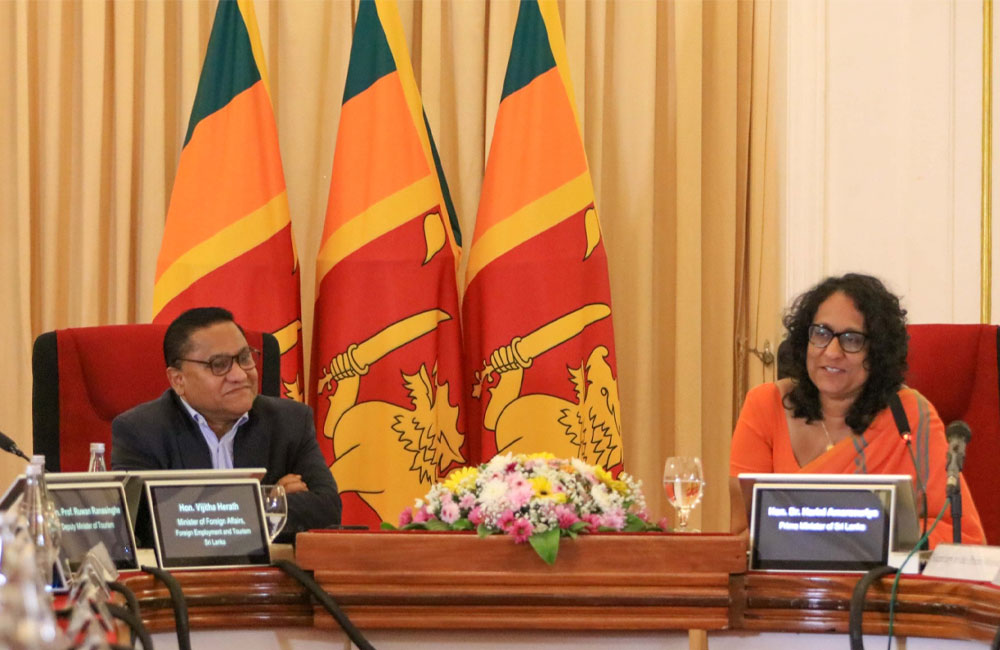
Prime Minister and Foreign Minister brief the Diplomatic Community on Flood Relief efforts and plans for rehabilitation and reconstruction
Prime Minister Dr. Harini Amarasuriya and Minister of Foreign Affairs, Foreign Employment & Tourism, Vijitha Herath yesterday (05 December 2025) co-chaired a diplomatic briefing to update foreign Diplomatic Missions and International Organizations accredited to Sri Lanka, and Sri Lanka Missions and Honorary Consuls abroad, on national recovery and rebuilding efforts following adverse weather conditions caused by Cyclone Ditwa.
Prime Minister Amarasuriya expressed her sincere appreciation to all Diplomatic Missions, international organisations and other partners for their swift support during the emergency situation as well for the solidarity and assistance extended as the country undertakes extensive recovery efforts.
The Prime Minister noted that Sri Lanka has now transitioned from the emergency response phase into the recovery and reconstruction phase. She emphasized that the Government’s immediate priorities include the full restoration of essential services including electricity, water supply, transportation links, health facilities, and telecommunications across all affected districts, ensuring that communities can return to stability as quickly as possible.
The Prime Minister further noted that a comprehensive needs assessment is being conducted with the assistance of development partners, the results of which will guide the rehabilitation and reconstruction plans. Prime Minister Amarasuriya invited all international partners to support identified priority areas, including the repair and reconstruction of roads, bridges, and transport links; rehabilitation of canals, irrigation systems; restoration of safe water, sanitation, and hygiene services; and large-scale waste management and debris removal to reduce health and environmental risks. She reiterated the need for continued international solidarity and thanked all officials, first responders, and partners for their tireless efforts.
Director General of the Disaster Management Centre presented an overview of the current situation in the affected areas, as well as findings from early rapid damage assessments.
The Chairman of the Sri Lanka Tourism Development Authority together with representatives from the Sri Lanka Association of Inbound Tour Operators (SLAITO) and the Hotel Association of Sri Lanka (THASL) highlighted that key tourism sites including wildlife parks, marine parks, and cultural attractions have reopened and are accessible, and encouraged tourists to visit as overall tourism operations continue to stabilize. He further emphasized that prompt action was taken to evacuate all tourists stranded in the affected areas.
The tourism industry stakeholders emphasized that the strongest support the international community can offer Sri Lanka at this time is to continue choosing the country as a travel destination and requested the diplomatic community to encourage the regular review of travel advisories in line with improvements on-the-ground, which in turn will support the affected communities.
Representatives of the diplomatic corps and international organisations present at the meeting reaffirmed their solidarity with Sri Lanka and briefed on both ongoing initiatives and planned support measures to assist the country’s recovery and reconstruction efforts.
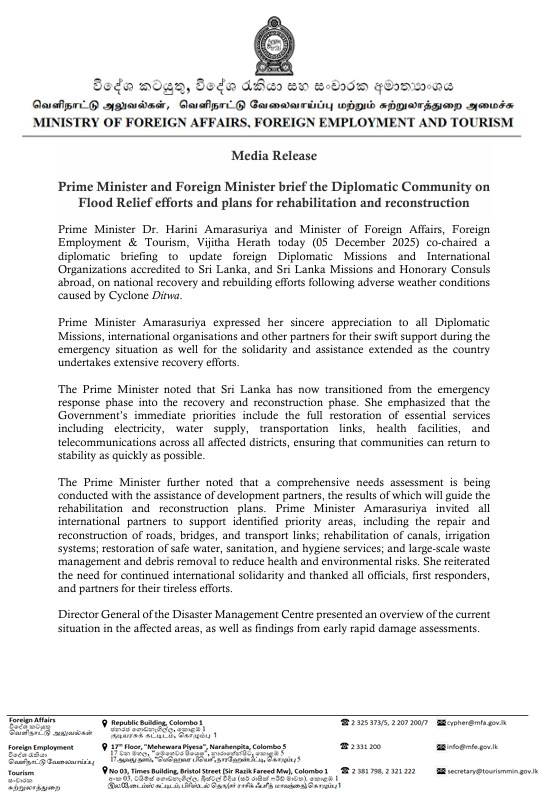
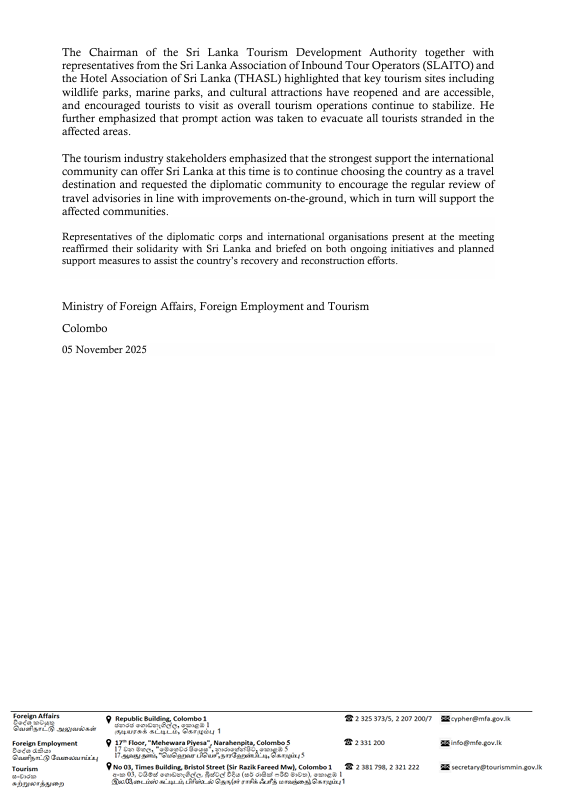

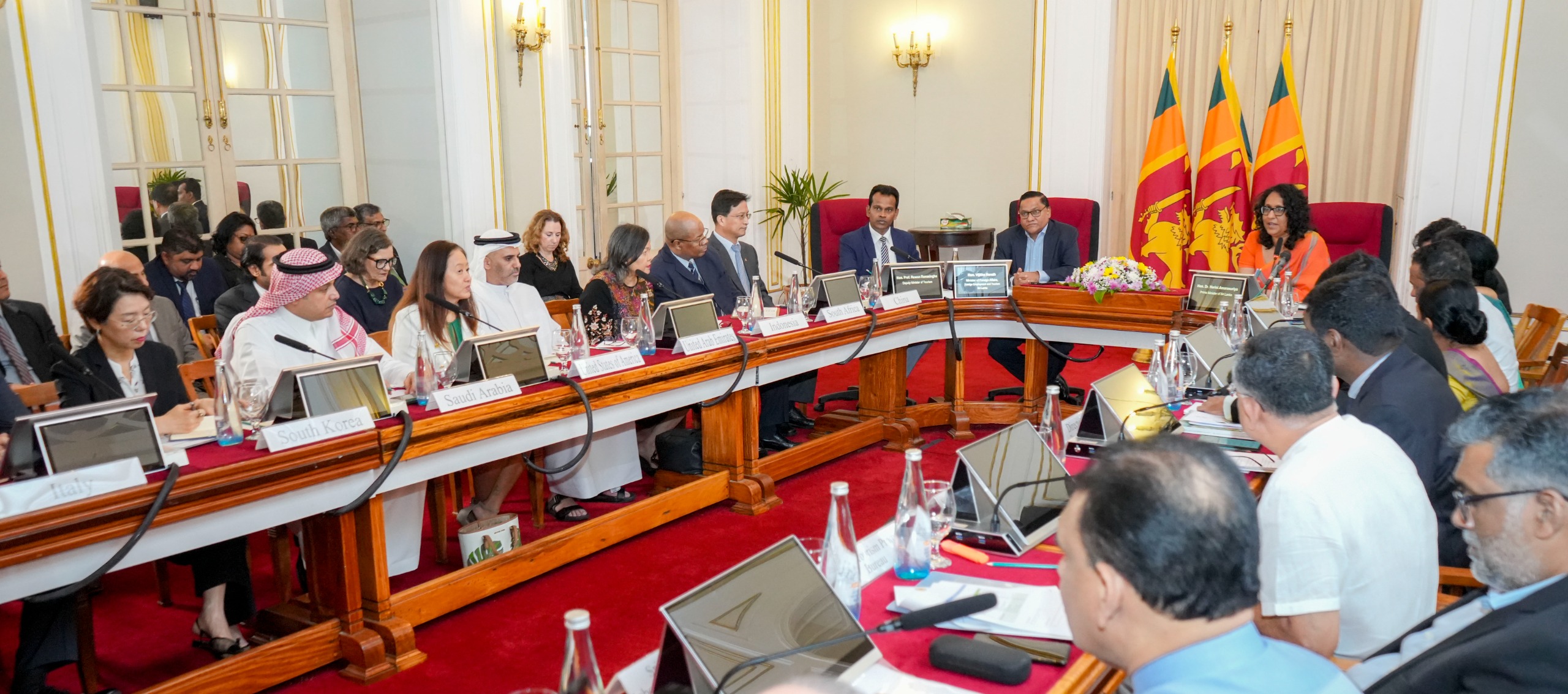
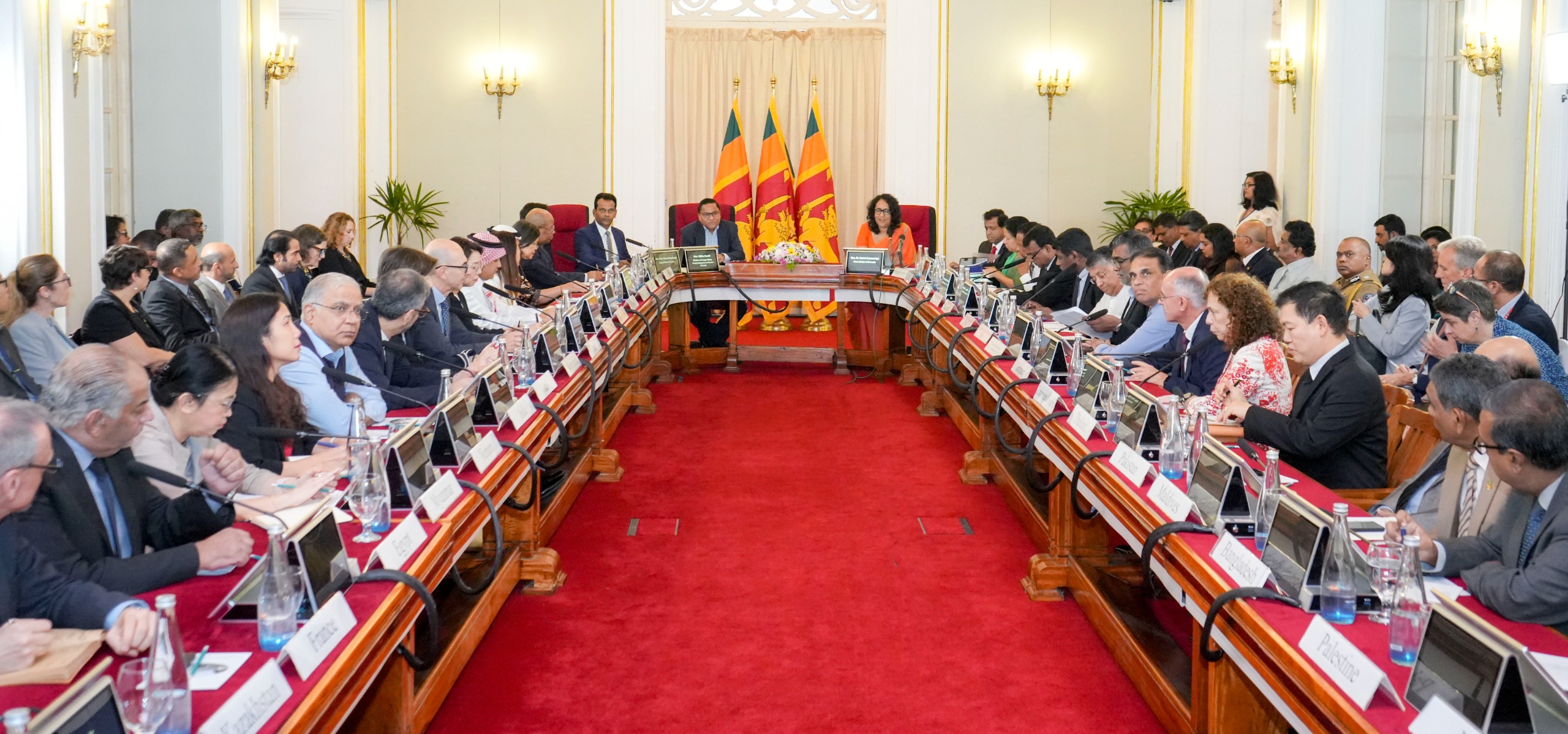
Ministry of Foreign Affairs, Foreign Employment and Tourism
Colombo
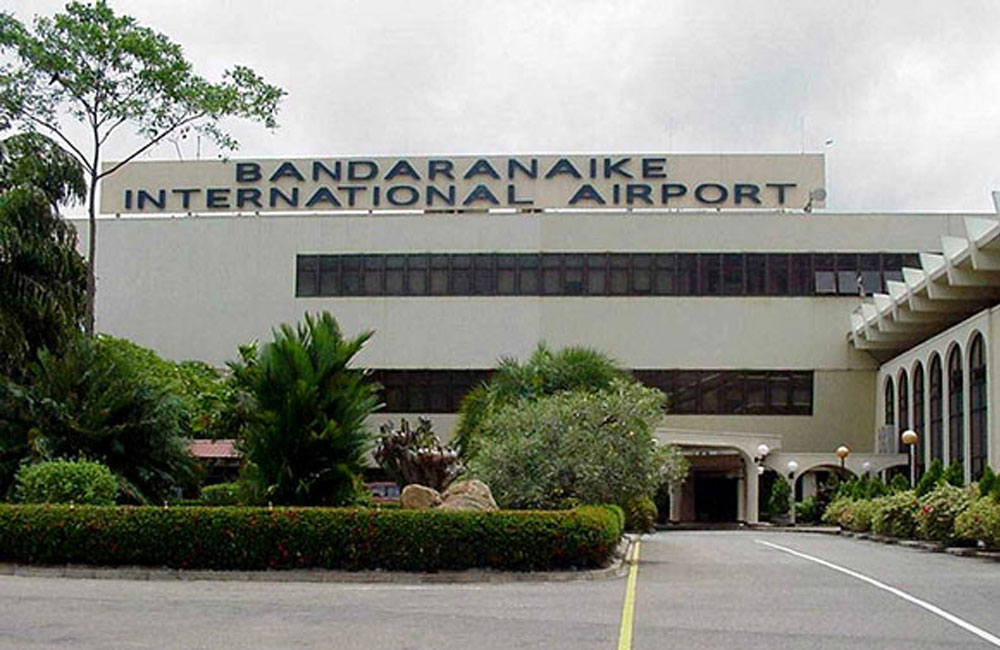
Tanzanian Passenger Delivers Baby Boy at BIA Transit Area
A 29-year-old woman from Tanzania gave birth at the Bandaranaike International Airport (BIA) early this morning shortly after arriving from Dubai.The woman, who landed on Fitz Air flight 8D-822 and was awaiting her connecting flight to Kuala Lumpur at the Airport Transit Terminal, suddenly began experiencing labor pains. Airport officials quickly directed her to the Airport Medical Treatment Center for urgent care.
Medical officers and nursing staff assisted in the delivery, successfully helping her bring a baby boy into the world. Following the birth, both mother and newborn were stabilised and transported by ambulance to the Negombo General Hospital for continued medical attention.

Sri Lanka’s Markets Poised for Major Upswing as Stability, Rebound Drive Optimism
Sri Lanka’s capital market is entering one of its strongest phases in a decade, with political stability, improving macroeconomic indicators and still-undervalued equities creating what investors describe as a “rare window for accelerated growth.”
This is the view of AFC Asia Frontier Fund Co-Fund Manager Ruchir Desai, who delivered an upbeat assessment at the Sri Lanka Economic Summit organised by The Ceylon Chamber of Commerce.
Desai, who has tracked Sri Lanka alongside frontier markets such as Bangladesh, Pakistan, Vietnam, Kazakhstan and Georgia since 2014, said the country has clearly turned a corner after a turbulent 2018–2023 period.
According to him, Sri Lanka now stands out for having regained both political and economic stability the two conditions he considers most critical for long-term investor confidence.
Having increased the Fund’s Sri Lankan exposure soon after visiting the country in November 2022 — which he described as the “bottom of the crisis”Desai said valuations at the time were among the most attractive in the region, with the market trading at approximately four times forward earnings. As macro conditions improved, the Fund elevated Sri Lanka to its second-largest country allocation, benefitting from rising equity prices and strategic accumulation.
“For the first time in many years, Sri Lanka has both economic and political stability. The platform is set for stable growth over the next three to four years, as long as this stability holds,” he stressed. The recent natural disaster, he added, is a temporary disruption and unlikely to dent forward-looking market sentiment.
Despite a robust 2.5-year recovery, Sri Lankan equities still trade below their fundamentals and below regional peers.
The broader market’s price-to-earnings ratio sits around 11 times far lower than the 14–16 times seen in 2014–2016, when foreign investors were far more active. Desai noted that company balance sheets have largely normalised, with strong earnings across banking, consumer and industrial sectors.
Illustrating the valuation gap, he compared Commercial Bank of Ceylon, trading near one-time book value, with Vietnam’s Vietcombank, valued at nearly 2.5 times book despite Sri Lankan banks showing stronger earnings momentum. He added that strong consumer-sector firms such as Sunshine Holdings also trade at modest multiples relative to peers in Asia.
Foreign participation at the Colombo Stock Exchange is now just 5–10% of daily turnover — a sharp decline from pre-2018 levels. But Desai emphasised this is part of a global trend, with capital gravitating toward US markets driven by strong S&P 500 and technology-sector gains. With Sri Lanka’s stability and fundamentals improving, he expects foreign inflows to return between 2025 and 2027.
At the same time, he warned that Sri Lanka cannot depend solely on foreign capital. Domestic participation remains shallow, with only 11–12% of unit trust assets invested in equities, far below India and Vietnam.
Desai underscored Sri Lanka’s long-term advantages: strong corporate governance, accessible company disclosures, resilient home-grown corporates, and high-potential sectors such as tourism and logistics. With a market-cap-to-GDP ratio of about 25%, he believes Sri Lanka has “significant room for expansion.”
Calling Sri Lanka one of his “top conviction markets,” Desai said he remains confident for the next two to three years — provided reforms stay on track and the country “does not drop the ball.”
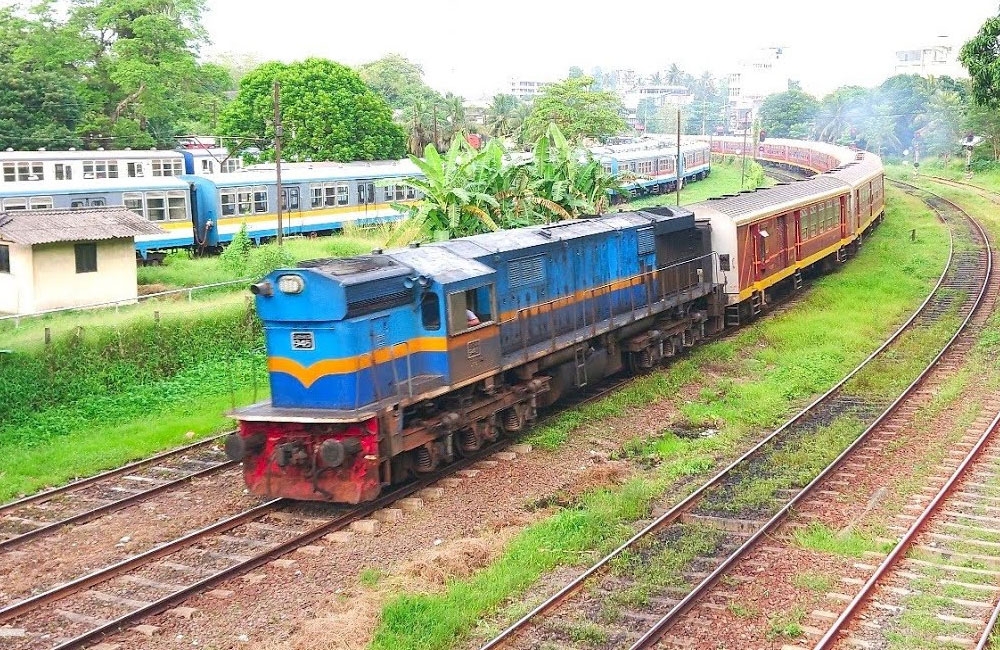
Train Services on Puttalam Line Extended Up to Nattandiya After Repairs
Train services on the Puttalam railway line have been extended to Nattandiya after repair work along the flood-damaged track was successfully completed, the Railway Department announced.Operations had been limited to the Colombo Fort-Kochchikade stretch over the past several days due to severe flooding and adverse weather conditions that affected parts of the line.
With restoration work on the Kochchikade-Nattandiya segment now finalized, trains are once again running the full length of the route from Colombo Fort to Nattandiya, bringing services back to regular capacity.

Deputy Minister Watagala’s Emergency Law Warning Sparks Outrage
Deputy Minister of Public Security and Parliamentary Affairs Sunil Watagala has come under sharp public and institutional criticism after urging police to invoke emergency regulations against individuals posting what he termed “defamatory” content about the President and senior ministers on social media.
His remarks, made in the middle of a national disaster response, have ignited a storm of concern over political overreach, abuse of emergency powers, and the chilling effect on citizens and journalists at a moment when transparent communication is vital.
The Sri Lanka Working Journalists Association (SLWJA) condemned the Deputy Minister’s comments in an unusually forceful statement, warning that his directive represented a direct assault on freedom of expression.
At a time when the government is working often under harsh scrutiny to provide relief and restore essential services, the SLWJA argued that such rhetoric only undermines public trust and creates the impression that the state is more interested in policing criticism than addressing urgent humanitarian needs.
Watagala made his remarks on 2 December during a meeting at the Malabe Divisional Secretariat, attended by several officials including Deputy Media Minister Dr. Kaushalya Ariyarathna.
Claiming that a coordinated campaign was underway to disseminate misleading information about the disaster, he alleged that false narratives were being spread through “physical means, social media, and even AI-generated content,” including by individuals based overseas.
However, what alarmed media organisations was not the acknowledgement of misinformation—which is a legitimate concern during emergencies but the Deputy Minister’s instruction to police officers to treat those posting such content “not merely as suspects but as offenders” under emergency regulations.
According to the SLWJA, this directive crosses a dangerous threshold by equating criticism and commentary with criminal activity.
The association accused the government of backtracking on democratic values it once promised to uphold. It added that this was part of a pattern of escalating pressure on journalists, editors, and digital platforms over the past year pressure that has intensified alongside political discomfort over disaster management shortcomings now under public scrutiny.
The SLWJA warned that weaponising disaster-related emergency powers to silence dissent poses a severe threat to constitutional rights.
Such actions, it said, weaken the credibility of the government’s relief efforts by creating suspicion that officials are attempting to suppress independent reporting rather than improve accountability.
A separate statement from Internet Media Action (IMA) echoed these concerns, calling the remarks a “serious threat to freedom of expression” and an “abuse of power.
” The IMA criticised Watagala’s claim that “malicious character assassination attacks” warranted harsh punishment under emergency law, noting that the distinction between scrutiny and defamation cannot be defined arbitrarily by political actors.
The organisation stressed that using emergency regulations designed for disaster management to suppress criticism amounts to “theft of fundamental rights.” Such rhetoric, it warned, could foster fear, discourage citizens from reporting lapses in relief operations, and ultimately hinder the government’s ability to correct errors on the ground.
“Criticism is not a crime,” the IMA insisted, demanding that Watagala withdraw his comments. Civil society groups have also urged the government to clarify its commitment to fundamental freedoms as it navigates the challenging task of rebuilding communities devastated by the disaster
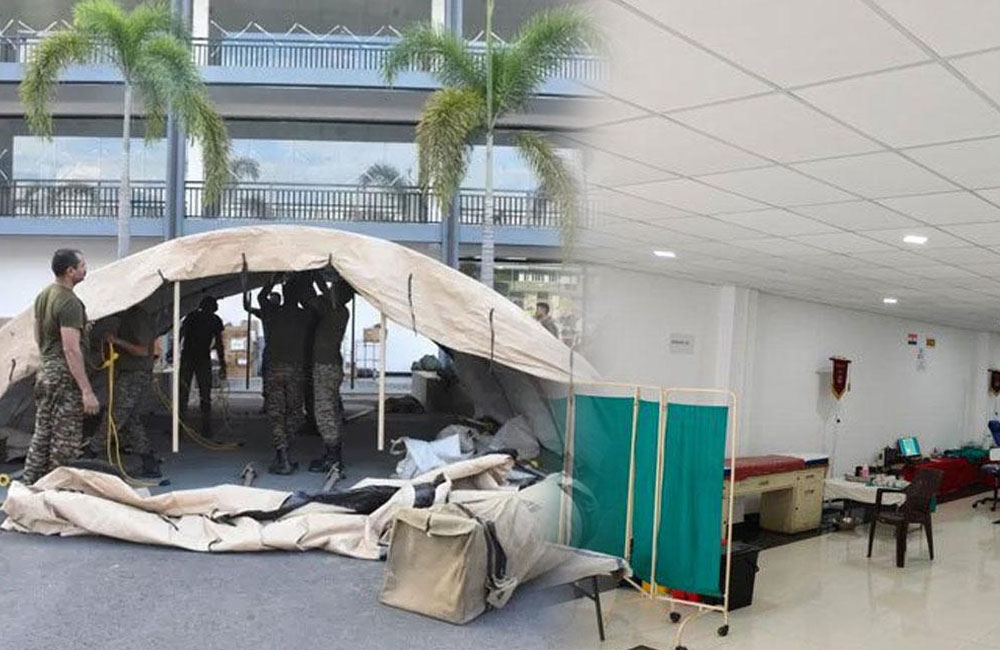
Indian Medical Team Establishes Emergency Field Hospital in Mahiyanganaya
A fully equipped field hospital has been deployed to Mahiyanganaya by an Indian medical team to assist residents suffering from the severe flooding in the region. The temporary medical facility is capable of delivering trauma care, conducting surgeries, and providing ambulance services, ensuring comprehensive treatment for those affected.
In a message shared on X, the High Commission of India in Colombo noted that the hospital was established to offer immediate and life-saving medical support directly within one of the most heavily impacted areas. The initiative is part of India’s ongoing humanitarian assistance to Sri Lanka following the recent disaster.
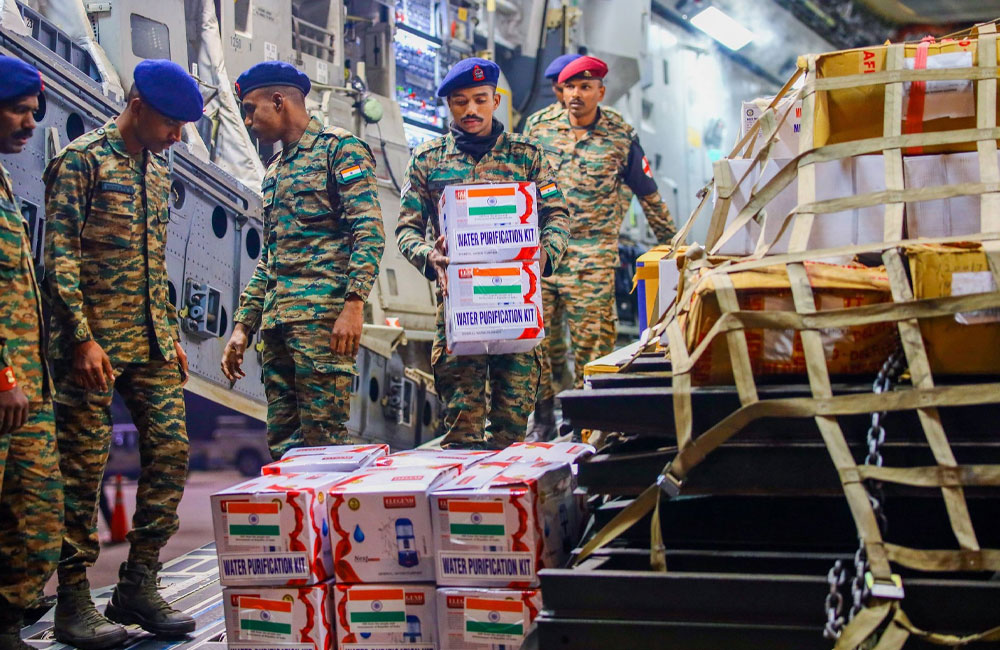
India Leverages Sri Lanka Disaster Aid to Consolidate Regional Influence
India’s relief mission to disaster-stricken Sri Lanka is being hailed as a humanitarian necessitybut beneath the emergency response lies a deeper strategic narrative reshaping power dynamics in the Indian Ocean. As floodwaters recede and the scale of destruction becomes clearer, foreign-policy specialists say the crisis has opened a critical window for New Delhi to reinforce its influence at a time when global rivals are also vying for economic and political space in Sri Lanka.
Following Cyclone Ditwah’s devastation, India moved with exceptional speed: military aircraft mobilised within hours, naval units placed on alert, and emergency supplies dispatched in successive waves. The arrival of the rapidly deployable Bailey bridge system aboard an Indian Air Force C-17 Globemaster was the most visible symbol of New Delhi’s intent to become Colombo’s indispensable first responder.
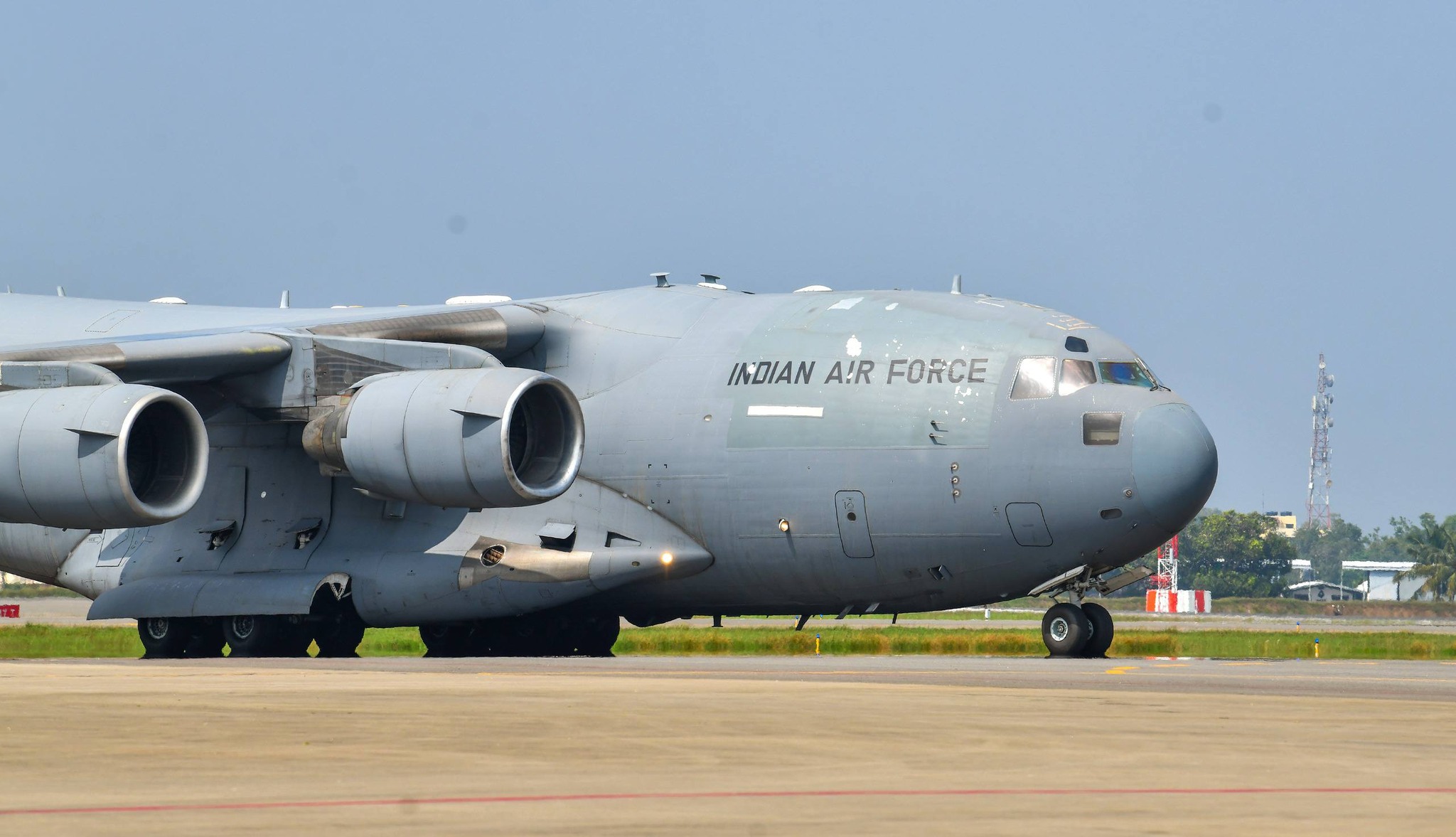
But foreign affairs experts argue that India’s actions must be read within the broader context of regional competition with China, whose infrastructural footprint in Sri Lanka has grown over the past decade. By delivering highly visible assistance military logistics, engineering teams, medical equipment, and multiple plane loads of relief suppliesIndia is signalling that its presence is not merely historical or cultural, but strategically essential.
Diplomatic insiders note that New Delhi has deliberately kept the relief highly public, highlighting its capacity to mobilise quickly and at scale. Each incoming aircraft reinforces a narrative of reliability at a time when Sri Lanka faces the dual burden of disaster recovery and a fragile economic revival. With the island’s estimated losses reaching 1–3 percent of GDP, external support will shape not only the humanitarian response but future economic alignments.
India’s approach also aligns with its “Security and Growth for All in the Region (SAGAR)” doctrine, which frames the Indian Ocean as a sphere where New Delhi must ensure stability and counterbalance external powers. Disaster relief, analysts say, has become a soft-power extension of this strategy building goodwill, strengthening institutional partnerships, and positioning India as the go-to regional guarantor during crises.
In Sri Lanka, public reaction to India’s assistance has been largely positive, contrasting earlier periods when bilateral relations were strained by political mistrust. The emphasis on practical, life-saving support bridges, generators, and medical units has shifted perceptions, presenting India as both empathetic and efficient.
As the reconstruction phase begins, India is likely to seek deeper engagement: infrastructure collaboration, credit lines for rebuilding, and expanded development cooperation. For New Delhi, disaster assistance is more than charityit is a strategic investment in long-term influence, executed at a moment when Sri Lanka needs external partners the most.
INDIA’S RELIEF ASSISTANCE TO POST-CYCLONE SRI LANKA
INDIA’S EMERGENCY AID – AT A GLANCE
Flights & Logistics
Total Indian relief flights: 6 confirmed sorties (C-17 Globemaster, C-130J, AN-32)
Additional flights on standby: 4
Air assets deployed: Heavy-lift transport aircraft + engineering teams
Relief Cargo (Estimated)
Total tonnage delivered: Approx. 240–280 metric tonnes
Bailey bridge System: 1 complete modular unit
Engineering crew: 12-member rapid deployment bridge team
Humanitarian Materials
Emergency shelters / tents: 3,500 units
Water purification systems: 48 units
Portable generators: 62
Medical emergency kits: 4,200
Family ration packs: 18,000
Inflatable rescue boats: 10
Satellite communication units: 14
Blankets & clothing: 22,000 items
Financial & Technical Support
Indicative value of assistance so far:
USD 6–8 million (LKR 2.0–2.7 billion)
Additional credit lines under consideration: For reconstruction materials & heavy machinery
Technical support: Structural engineers, disaster-management teams
Infrastructure Impact
Bridges destroyed in Sri Lanka: 15
Roads affected: 254
Roads reopened with aid-supported access: 159 (as of Dec 3)

Train Season Tickets Temporarily Accepted on SLTB Buses Amid Disaster Conditions
The Sri Lanka Transport Board (SLTB) has announced a temporary travel arrangement allowing commuters with valid train monthly season tickets to use them on SLTB buses, introduced in response to the prevailing disaster situation across the country.
Under this measure, train season ticket holders can board any ordinary SLTB service, though the exemption does not extend to super luxury buses.
The SLTB confirmed that all bus crews and operational teams have been instructed to facilitate the initiative to ensure uninterrupted travel for affected passengers.
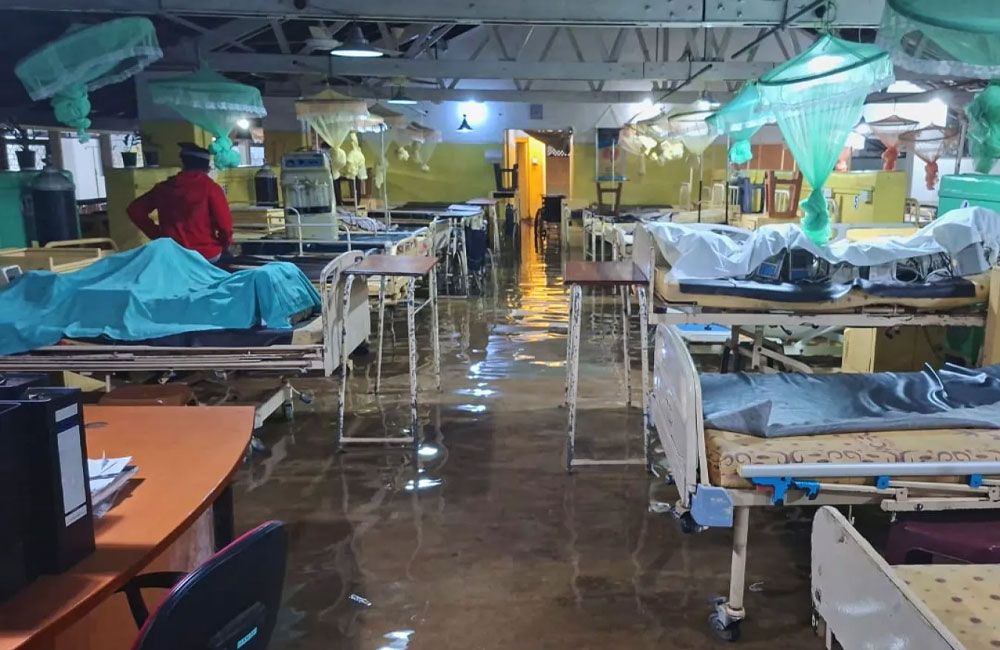
Three hospitals extensively damaged
Three hospitals – Chilaw Base Hospital, Mahiyanganaya and Wattegama hospitals- have sustained extensive damage from the latest disasters induced by cyclone Ditwah and another 100 small hospitals have been submerged by the floodwaters, an official said.
The cyclonic storm has inflicted the biggest damage to the Chilaw hospital, with all vital medical equipment, including the CT scan machine, being hit, according to Health Ministry Secretary Dr. Anil Jasinghe.
Dr. Jasinghe told Daily Mirror that only daytime OPD (Out-Patient Department) treatment and emergency care are carried out at the moment.
“The hospital in Chilaw has been affected the most. Besides, the Wattegama and Mahiyanganaya hospitals have been hit. In Wattegama, we evacuated all the patients. We are carrying out an assessment to see whether any equipment at these hospitals is salvageable,” he said.
Besides, he said 100 hospitals remain inundated.
Asked whether any rough estimate of the damages has been taken, he said it is yet to be done.
Commenting on assistance from the international agencies, he said the World Health Organisation (WHO) had already provided Rs.53 million to the National Health Development Fund at this time.
Dr.Jasinghe said the health authorities regularly assess the health needs of people living in welfare centres after the disaster
(Source - Dailymirror)
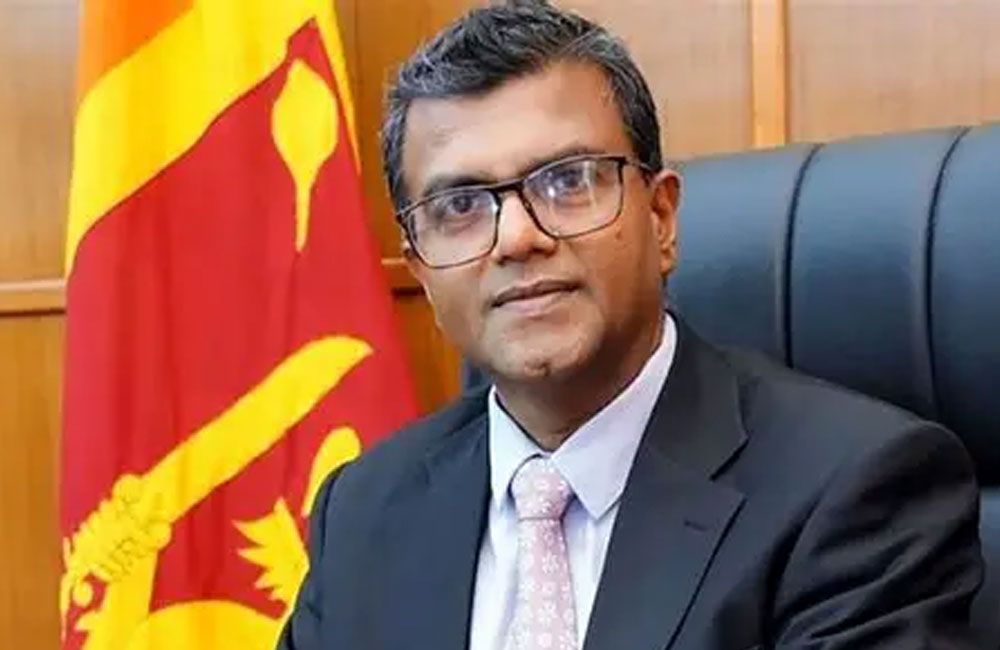
Sri Lanka Rallies Banks to Aid Cyclone-Disaster Victims
Sri Lanka’s financial system is taking on a critical role in the national response to Cyclone Ditwah and the floods that swept across multiple districts, displacing thousands and devastating homes, agriculture, and small businesses. As authorities rush to stabilise communities and restore functioning markets, the Treasury is engaging the banking and insurance sectors to mobilise liquidity, accelerate claims settlements, and cushion vulnerable groups from further economic shock.
Treasury Secretary Dr. Harshana Suriyapperuma told the Sri Lanka Economic and Investment Summit that the Government is working closely with financial institutions to ensure households, SMEs, and businesses receive swift relief. With rural families, micro-entrepreneurs, and small industries bearing the brunt of the disaster, the challenge lies in preventing a secondary economic collapse triggered by loan defaults, uninsured losses, and disrupted income streams.
According to Dr. Suriyapperuma, banks and insurers have already been approached to evaluate the scale of exposure within their portfolios. The Treasury is pushing for temporary moratoria, flexible repayment schedules, concessional recovery loans, and fast-tracked insurance payouts. He is expected to meet the insurance regulator and industry leaders this week to coordinate sector-wide responses, emphasising the urgency of getting businesses back on their feet.
Emergency fiscal measures are also being activated. Nearly Rs. 30 billion from pre-provisioned disaster reserves has been earmarked for immediate relief, while Rs. 7.5 billion has already been released to support housing repairs and reconstruction. Spending authority has been decentralised, allowing District Secretaries to use up to Rs. 50 million and Ministry Secretaries Rs. 150 million without bureaucratic delays.
A rapid damage assessment is underway with World Bank assistance, expected to deliver initial figures within two weeks. Early estimates indicate massive loss to housing, roads, agriculture, and small-scale industries sectors heavily dependent on bank credit.
Financial institutions, telecom operators, and private-sector partners have also stepped in, contributing to relief funds that have already surpassed Rs. 300 million, with over 100,000 individual transactions, many in foreign currency. Banks have opened special donation windows and are preparing concessional loan schemes for affected customers.
Customs has simplified clearance procedures for disaster-relief consignments, while the Government has approved a multi-stakeholder Rebuilding Sri Lanka Fund to channel private and state financing into long-term reconstruction.
Despite the scale of destruction, Dr. Suriyapperuma insists the 2026 macroeconomic reform path remains intact, arguing that strong financial discipline and anti-corruption measures created the fiscal buffers needed to withstand shocks of this magnitude. He stressed that SMEs the backbone of employment will remain at the centre of the recovery strategy, supported by multilateral partners already coordinating with the Treasury.
While the cyclone’s economic fallout is significant, the Government maintains that with coordinated public–private action and disciplined financial management, the disaster will not derail Sri Lanka’s recovery trajectory
Page 40 of 660
